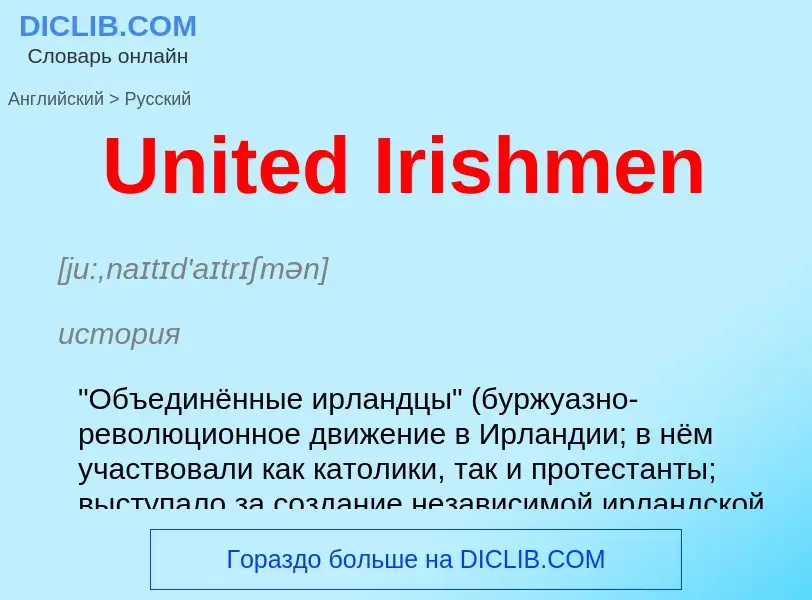Перевод и анализ слов искусственным интеллектом ChatGPT
На этой странице Вы можете получить подробный анализ слова или словосочетания, произведенный с помощью лучшей на сегодняшний день технологии искусственного интеллекта:
- как употребляется слово
- частота употребления
- используется оно чаще в устной или письменной речи
- варианты перевода слова
- примеры употребления (несколько фраз с переводом)
- этимология
United Irishmen - перевод на русский
[ju:,naɪtɪd'aɪtrɪʃmən]
история
"Объединённые ирландцы" (буржуазно-революционное движение в Ирландии; в нём участвовали как католики, так и протестанты; выступало за создание независимой ирландской республики, отмену сословных и феодальных привилегий, парламентскую реформу и всеобщее избирательное право, в т.ч. для католиков; вылилось в восстание, кот. было жестоко подавлено; 1791-98)
существительное
общая лексика
информационное агентство Юнайтед пресс Интернэшнл, ЮПИ
синоним
[,mæntʃɪstəju:'naɪtɪd]
общая лексика
"Манчестер юнайтед" (популярный футбольный клуб со стадионом "Олд-Траффорд")
синоним
Определение
Википедия

The Society of United Irishmen was a sworn association in the Kingdom of Ireland formed in the wake of the French Revolution to secure "an equal representation of all the people" in a national government. Despairing of constitutional reform, in 1798 the United Irishmen instigated a republican insurrection in defiance of British Crown forces and of Irish sectarian division. Their suppression was a prelude to the abolition of the Protestant Ascendancy Parliament in Dublin and to Ireland's incorporation in a United Kingdom with Great Britain. An attempt to revive the movement and renew the insurrection following the Acts of Union was defeated in 1803.
Espousing principles they believed had been vindicated by American independence and by the French Declaration of the Rights of Man, the Presbyterian merchants who formed the first United society in Belfast in 1791 vowed to make common cause with their Catholic-majority fellow countrymen. Their "cordial union" would upend Ireland's Protestant (Anglican) Ascendancy and hold her government accountable to a representative Parliament.
As the society replicated in Belfast, Dublin, and across rural Ireland, its membership test was administered to workingmen (and in cases women) who maintained their own democratic clubs, and to tenant farmers organised against the Protestant gentry in secret fraternities. The goals of the movement were restated in uncompromising terms: Catholic emancipation and reform became the call for universal manhood suffrage (every man a citizen) and for an Irish republic. Preparations were laid for an insurrection to be assisted by the French and by new United societies in Scotland and England. Plans were disrupted by government infiltration and by martial-law arrests and seizures, so that when it came in the summer of 1798 the call to arms resulted a series of uncoordinated local risings.
The British government seized on the rebellion to argue the greater security of a union with Great Britain. In 1800 the Irish legislature was abolished in favour of a United Kingdom parliament at Westminster. The attempt to restore the movement by organising on strictly military lines failed to elicit a response in what had been the United heartlands in the north, and misfired in 1803 with Robert Emmet's rising in Dublin.
Since the rebellion's centenary in 1898, Irish nationalists and Ulster unionists have contested its legacy.




![Detail of the [[Battle of Ballynahinch]] 1798 by Thomas Robinson. Yeomanry prepare to hang United Irish insurgent Hugh McCulloch, a grocer. Detail of the [[Battle of Ballynahinch]] 1798 by Thomas Robinson. Yeomanry prepare to hang United Irish insurgent Hugh McCulloch, a grocer.](https://commons.wikimedia.org/wiki/Special:FilePath/Battle of Ballynahinch (detail).jpg?width=200)

![Volunteers]]) Volunteers]])](https://commons.wikimedia.org/wiki/Special:FilePath/MADDEN(1888) p111 PEEP-OF-DAY BOYS.jpg?width=200)

![Inscription, [[Bodenstown]] Inscription, [[Bodenstown]]](https://commons.wikimedia.org/wiki/Special:FilePath/One of the inscribed flagstones on the steps leading to the grave.jpg?width=200)




!["God Save the Queen" and a United Irish motto "[[Erin Go Bragh]]", Ulster Unionist Convention, 1892 "God Save the Queen" and a United Irish motto "[[Erin Go Bragh]]", Ulster Unionist Convention, 1892](https://commons.wikimedia.org/wiki/Special:FilePath/Unionist Convention 1892.jpg?width=200)

.jpg?width=200)
 (14755909362).jpg?width=200)
![Portrait photograph of [[E. W. Scripps]], c. 1912 Portrait photograph of [[E. W. Scripps]], c. 1912](https://commons.wikimedia.org/wiki/Special:FilePath/E W Scripps.jpg?width=200)



![The ''[[United Trinity]]'' statue of [[George Best]] (left), [[Denis Law]] (centre) and [[Bobby Charlton]] (right) outside Old Trafford The ''[[United Trinity]]'' statue of [[George Best]] (left), [[Denis Law]] (centre) and [[Bobby Charlton]] (right) outside Old Trafford](https://commons.wikimedia.org/wiki/Special:FilePath/Manchester The United trinity.jpg?width=200)



![Average [[Old Trafford]] Manchester United attendance, 1949–2009 Average [[Old Trafford]] Manchester United attendance, 1949–2009](https://commons.wikimedia.org/wiki/Special:FilePath/Oldtraffordaverageattendances.png?width=200)

![1998–99 season]] are displayed at the club's museum. 1998–99 season]] are displayed at the club's museum.](https://commons.wikimedia.org/wiki/Special:FilePath/The Champions League Winners Medal (Manchester United Museum) (262769292).jpg?width=200)
![An official partner of the club, [[Turkish Airlines]] in Manchester United livery An official partner of the club, [[Turkish Airlines]] in Manchester United livery](https://commons.wikimedia.org/wiki/Special:FilePath/Turkish Airlines Boeing 737-800 ManU Karakas.jpg?width=200)
